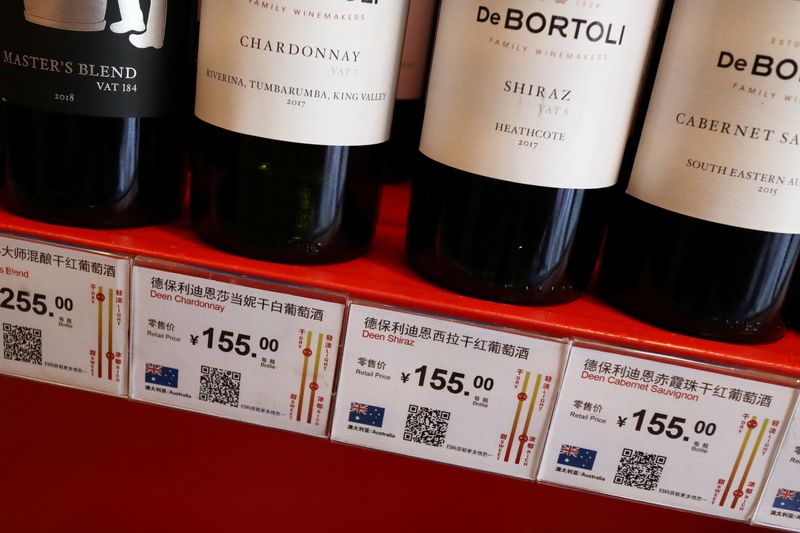By Praveen Menon
SYDNEY (Reuters) - Australia's wine industry faces severe oversupply problems that will need years to resolve, experts say, pointing to Chinese tariffs, high production and export bottlenecks during the COVID-19 pandemic.
Vineyards nationwide have enough wine in domestic storage to fill 859 Olympic swimming pools, Rabobank said this week in its third-quarter wine report.
"That’s over two billion litres of wine, or over 2.8 billion bottles," said RaboResearch analyst Pia Piggott, adding that the inventory was depressing prices, particularly for commercial red wines.
Ties with biggest trading partner China deteriorated in 2020 after Australia called for an inquiry into the origins of COVID, triggering reprisals by Beijing, such as anti-dumping duties on Australian wine and barley.
The curbs battered the wine industry, with exports to China shrinking to just A$8.1 million ($5.2 million) in the year to June, from a peak of A$1.2 billion for the year to January 2020, when the pandemic began to take hold.
"No other market can quickly compensate for the China market," said Lee McLean, chief executive of industry body Australian Grape & Wine, thanks to Chinese drinkers' obsession with red wine.
Diversification into markets such as Britain, Europe, the United States, and elsewhere in Asia would take time to yield results, McLean added.
China, traditionally an avid purchaser of Australian commodities, including iron ore, resumed buying coal and timber this year after tension between the two has eased since the centre-left Labor party won power in Australia last year.
The recent removal of tariffs on Australian barley has fed hopes for an early easing of the five-year tariffs China imposed on Australian wine in 2021.
But even if the tariffs are lifted this year and Chinese wine consumption recovers, Australia’s wine industry will take at least two years to work through the surplus, Piggott said, as the curbs had coincided with an exceptional growing season.
"This coincided with COVID, logistics bottlenecks and inflation, which were major hurdles in the way of plans to grow and diversify exports," she added.
"Thus, two-plus years into the tariff, prices of Australian commercial red grapes have significantly declined, and oversupply issues remain."
Australian wine exports declined a tenth in value to A$1.87 billion and 1% in volume to 621 million litres in the year ended June, Wine Australia’s Export Report said in July.
This week, Australia's Treasury Wine Estates (OTC:TSRYF), the world's biggest standalone winemaker, reported a drop in its profits, hurt by lower sales.
Wine sales will not return to the same level for the company even if the high tariffs are dropped, its chief executive said in May.
The crisis has made quality red wines more affordable for Australian domestic consumers, however.
"All we can say is next time you go to buy a bottle of wine, make sure it's Australian," McLean said.
($1=1.5613 Australian dollars)
(This story has been officially corrected by RaboResearch to say 2.8 billion bottles, and not 2.8 million, in paragraph 3)
